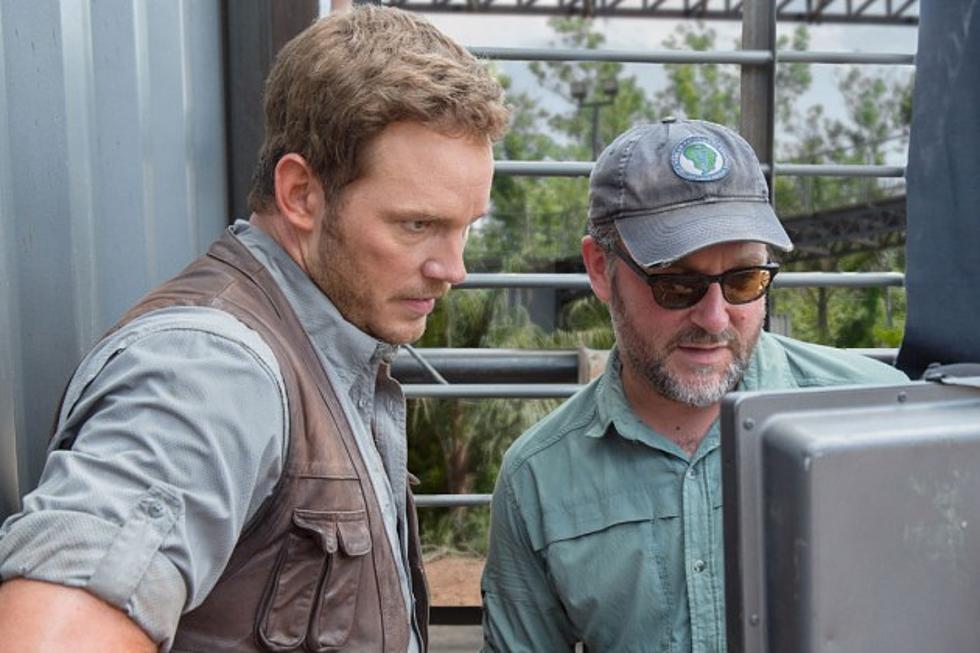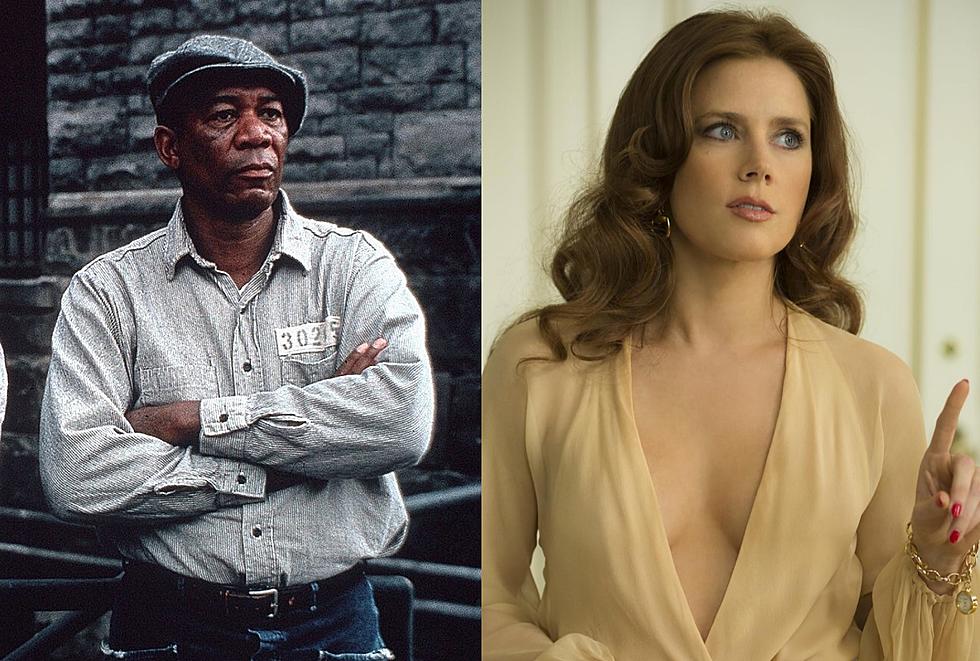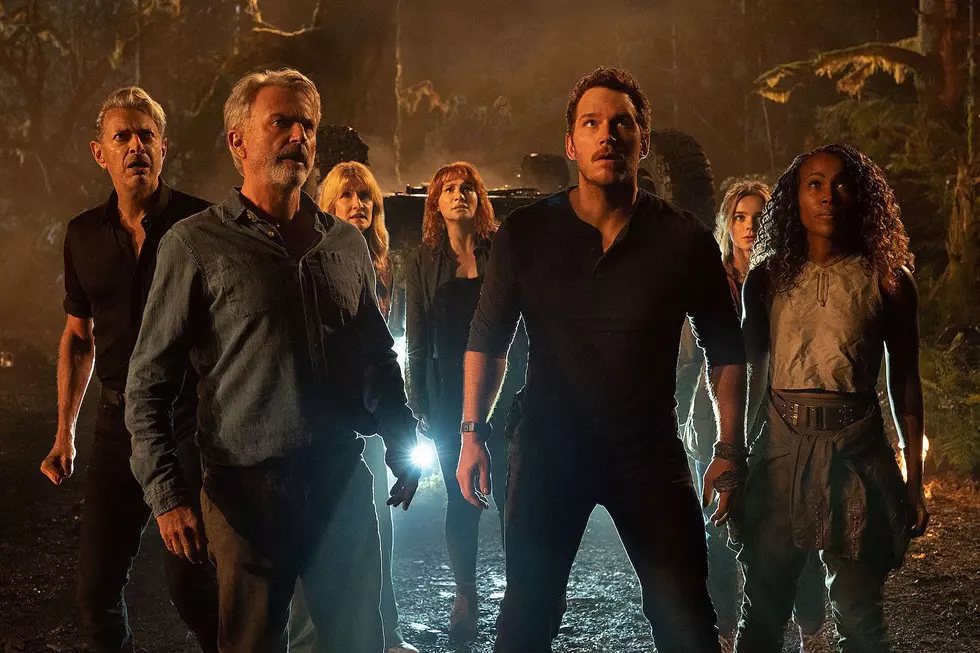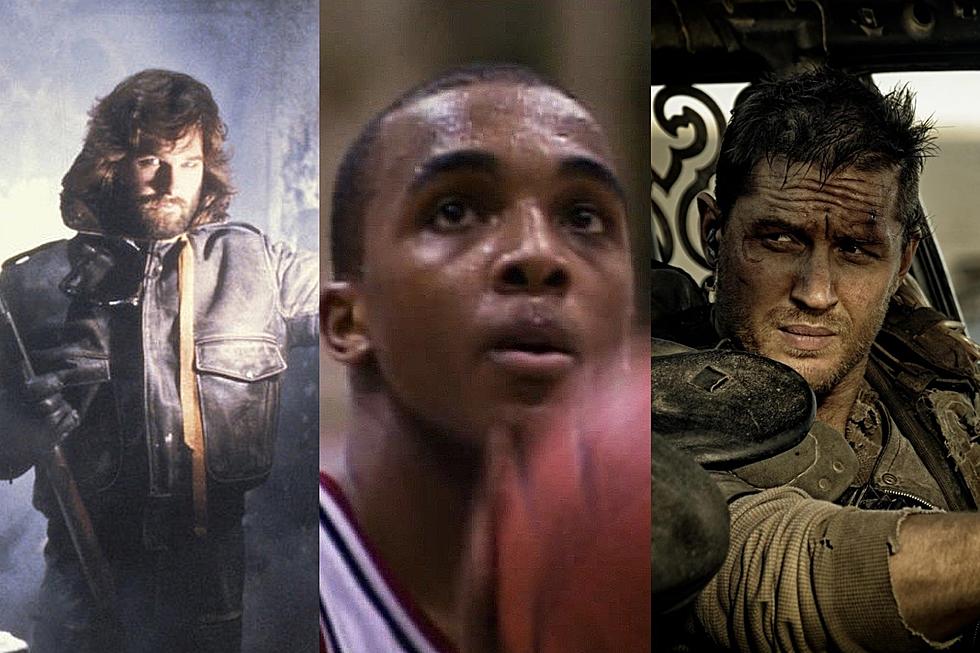
Colin Trevorrow on the Three Things Steven Spielberg Said Had to Be in ‘Jurassic World’
Steven Spielberg had been trying to make another sequel to Jurassic Park for about 12 years and had made little progress. There were numerous scripts written (including one notorious version by John Sayles and William Monaghan that included a trained raptor squad in body armor going after drug lords in the jungle), but nothing that was intriguing enough to move forward a new film.
Then Brad Bird recommended to producer Frank Marshall a young director named Colin Trevorrow who had just released his feature debut, Safety Not Guaranteed. Then, after so many delays, Trevorrow pitched Spielberg and Marshall his take on Jurassic World, got the greenlight from Universal and just two years later is ready to deliver his finished film to audiences this week.
We spoke to Trevorrow recently about working on the film, the three fundamental ideas Spielberg had for any new Jurassic Park sequel and how he almost directed a Star Wars movie.
This must be a pretty exciting, nervous time for you. You directed a Jurassic Park movie and it comes out in a few days.
I haven't had time to unpack any of that. But man, being able to hear that people are enjoying the movie is deeply satisfying.
Have you watched it yet with an audience?
I have twice. We didn't test the movie at all, so I didn't have that experience at all. We watched it up at Skywalker Ranch with a bunch of employees at ILM, Lucasfilm and Pixar. That was a great night. A bunch of my friends from high school came out. Then the premiere in Paris. That was a blast. I had my whole family there. They've both been very personal screenings. I haven't seen it with a crowd of people, so I'm looking forward to that.
Were you working on this movie right up until that Paris premiere?
I used every second I had available. We finished it on May 10. That’s pretty last minute. I know some movies have pushed it a little further, but we had a 3D release day-and-date around the world, so there was a lot of things that had to come together after it was done. We had that [Skywalker Ranch] screening right at the beginning of May. And, actually I cut one short 30-second scene right after that. So I guess I did have my own personal test screening. But, nothing was forced on me. It was all very organic.
As much as directors may hate to admit it, test screenings can be useful. Was it hard to go through this with no outside feedback?
We had a very small circle. Me, Steven, Frank [Marshall], my editor Kevin Stitt...my wife, of course (laughs). But, I trusted my instincts from the beginning to the end on this one. I knew very clearly what I wanted. I know there is value in testing films, but I’m not a big fan of audience feedback screenings. I think it helps to see the film with an audience where you can feel something. You hold yourself to a higher standard when there’s a crowd in there.
Otherwise, you're seeing the movie right out of our AVID. Just a couple guys in a room.
You say you knew very clearly what you wanted, but when you came on to Jurassic World, there was already a script in place. What did you keep from that and what did you replace?
We started from scratch. There were three very fundamental ideas that Steven had mandated to Rick [Jaffa] and Amanda [Silver] and we kept those. The park is open, there is a raptor trainer and the dinosaur that breaks free and threatens the park. The only other thing that we kept from the Rick and Amanda script was that there were two boys. In their script, they were Chinese and were the sons of a Chinese paleontologist that was going to the park because the DNA of a dinosaur she had found had been stolen. So, obviously, very, very different movie. But, that was about it.
It was very stressful time, where I could’ve just taken that script and made it, but I felt like the worst possible fate for someone like me was to make a bad Jurassic Park movie. It’s not so much about the script, just my interpretation of it and how well I understood it and I just didn’t know how to do it.
So I went back to Frank and Steven and said, “You just gotta let us write and trust that I know how to execute it,” and they were of course a bit skeptical at first. “OK, kid, you go write your movie. We've been trying to do this for 12 years now...” (laughs). And I don’t know exactly what we channeled to write the movie you see now, but it goes back to something we probably all share. We all want to make a dinosaur movie.
Did you ever read that old Jurassic Park 4 script by John Sayles?
I did! I had only read Rick and Amanda's once and read [the Sayles] script once a little later down the line because I was so curious. Honestly man? I liked it in a lot of ways. I knew what was going on. What was going on was bananas, but that's not a bad thing! My movie is bananas. There's a lot in there to like. It’s nuts in a lot of the right ways.
With the raptor training, your film does seem to share some distant DNA with that script. It’s not like this is just a reboot of the first film.
Yeah, that was my biggest fear: making a carbon copy reboot. One thing you can say is that none of those [sequel] scripts were carbon copies. They all tried to do something different. I was more interested in what the Sayles script was trying to do because it was so daring. It was trying to set a tone for how far forward we needed to push. The one thing about all those scripts is that it took us too far forward with man’s progressions with dinosaurs. [Co-writer] Derek [Connelly] and I, one of our first notions was that we needed to dial this back to the point where there’s a raptor trainer who's attempting to do this, but has a very tenuous relationship with it. Like, how we have men and women in Africa who are trying to stick their heads in the mouths of lions.
Brad Bird mentioned that you came on to Jurassic World in part because he recommended you for Star Wars: Episode 7. So, there was a time in your life when you could've directed either a Jurassic Park or Star Wars movie.
The Star Wars thing, I remember being informed of that by the internet. You can imagine how weird that is. I was sitting there in my house in Vermont and my wife said, “Apparently you're considered to direct Star Wars.” Later, I found out where that rumor came from and it was more about conversations Brad was having and trying to figure out a way to do what he wanted to do. And Brad and I really have a similar set of priorities and that’s why he’s become such a great mentor and a friend. We really want to make sure that filmmakers continue to make original films and make risks and challenge themselves. That’s important to me. That informed the way I made Jurassic World. I wanted an original film in the context of Jurassic Park as opposed to a straight sequel with all the same people we already know. That doesn’t mean that I’m not going to do these types of global entertainment movies as well, because I really loved doing this movie. It’s a big part of why I became a filmmaker, I’m not going to pretend.
So, if they came to you now with a Star Wars movie, it's not like you would turn them down.
I don’t know about the Star Wars spinoffs. I know I'm definitely not going to be doing the Boba Fett movie. I can tell you that for a fact. But I think they're making some really cool choices. Rian Johnson is a filmmaker that I respect so much. I know Kathy [Kennedy] and that whole group at Lucasfilm from working on this and, I don't know anything about what they’re doing, but there’s a genuine love for that franchise that has permeated through the walls up there. It’s very exciting.
Did you take advantage of having the Universal Studios staff at your disposal when it came to designing the park?
Yes. [Producer] Pat Crowley and I went to Universal Studios here in LA and the one in Florida. We went to Disneyland and Disney World, as well. We went behind the scenes and got to see how some of the rides work. It was especially helpful as we got to see how the control room worked. That room that can see everything. It really helped form how we designed that control room. Everything in that room is practical, by the way. All those videos were running live as we shot it. If you’re Jake Johnson and you’re in that space, everything you're looking at is everything he saw on that set every day.
Did you have any problems getting Verizon to sponsor a serial killer dinosaur?
They did approve it! The product placement and partnerships in this movie is a fascinating sub topic. Everybody who participated was fully aware that the oldest creatures to ever walk the Earth are going to destroy them. They were all OK with that. It was a pretty good trade.
There was some talk that the original name of the Indominus Rex was the Diabolus Rex. Why the change?
That was my first really poor attempt at trying to misdirect the internet and trying to keep things secret and after that, I just gave up. I don’t have any bitterness. I am so fully aware of why we all want this information. That was my initial, really weak attempt at some mystery box action. It just failed. I stopped trying.
There was a big leak of information during filming.
That was a bummer. That leak came from a very specific source that spoke to one website that had a choice to run that information or not. I was frustrated because there is such a thing as holding a story. I was bummed out that [they] chose to [run the story]. I certainly understand the motivation for it. In the end, what I decided to embrace is the progressive way that I could communicate with the fans and let them know that they were a part of making this movie. Very early on in the game I remember tweeting about how we were all directing Jurassic Park 4. I do believe that. I'm a representative of a generation of people who want this movie to be everything that I wanted it to be. Being able to bring people in and experience it all together was a part of the moviegoing experience.
So you’re not coming back to direct the next film, but will you be involved in some sort of advisory role?
I’m a really honest interview, so when I said that I was just giving them the real answer. I didn't really think about how that was going to be interpreted. When you hear I’m not going to be doing the next movie, you think it means one of three things: the movie sucks, the studio thinks I did a bad job, or I had a bad experience. None of those things are true. This decision was made a long time ago between Steven and I and it’s because of reasons that are very earnest ones. I want to tell as many different stories as possible.
Yes, I will be involved [in the sequel] in some creative way, whatever that credit turns out to be. To me, it’s recognizing that these are very difficult movies to franchise. It’s not easy to make a sequel to a Jurassic Park movie. And I think we saw diminishing returns, even from some very gifted and talented people. To me, my interpretation of it is that this is a series that is best served by the Mission: Impossible model. The way they do it is they bring in a new voice every time and those movies have been consistently pretty awesome. So, I feel like this is my opportunity to find someone else who is every bit as hungry as I was when I got this opportunity.
More From ScreenCrush









